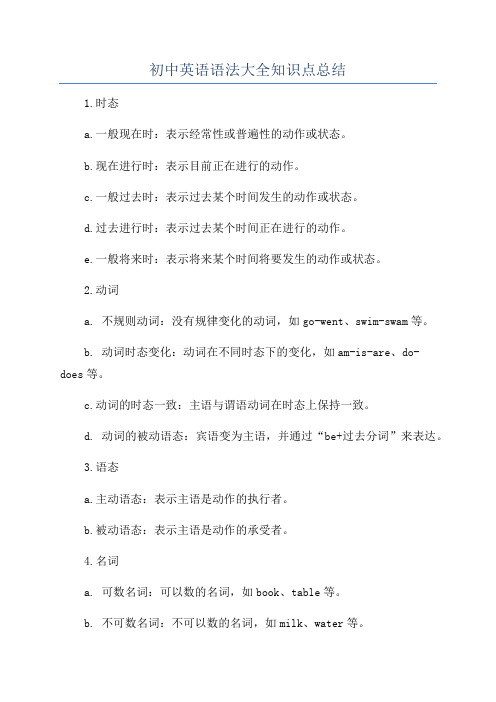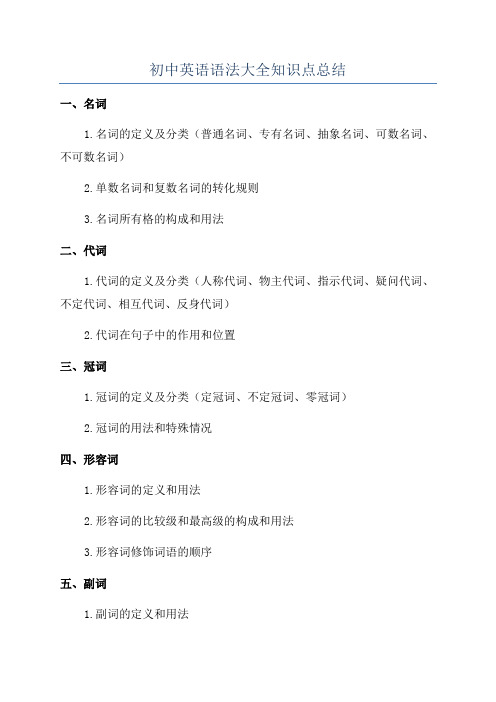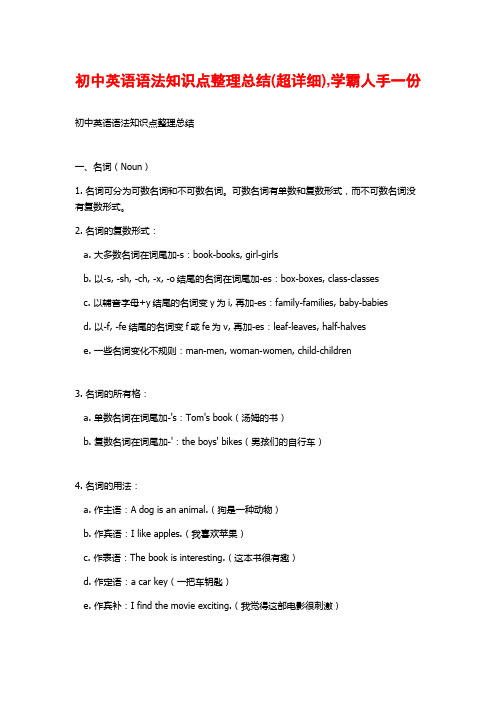初中英语语法知识点
初中英语语法大全知识点总结

初中英语语法大全知识点总结1.时态a.一般现在时:表示经常性或普遍性的动作或状态。
b.现在进行时:表示目前正在进行的动作。
c.一般过去时:表示过去某个时间发生的动作或状态。
d.过去进行时:表示过去某个时间正在进行的动作。
e.一般将来时:表示将来某个时间将要发生的动作或状态。
2.动词a. 不规则动词:没有规律变化的动词,如go-went、swim-swam等。
b. 动词时态变化:动词在不同时态下的变化,如am-is-are、do-does等。
c.动词的时态一致:主语与谓语动词在时态上保持一致。
d. 动词的被动语态:宾语变为主语,并通过“be+过去分词”来表达。
3.语态a.主动语态:表示主语是动作的执行者。
b.被动语态:表示主语是动作的承受者。
4.名词a. 可数名词:可以数的名词,如book、table等。
b. 不可数名词:不可以数的名词,如milk、water等。
c.名词的单复数形式:根据名词的规则变化及不规则变化来表达单复数形式。
5.代词a. 主格代词:作主语或表语,如I、you等。
b. 宾格代词:作宾语或介词宾语,如me、him等。
c. 形容词性物主代词:表示所属关系,如my、your等。
d. 名词性物主代词:作主语、宾语或表语,表示所有关系,如mine、yours等。
6.冠词a. 定冠词:表示特指的人或物,如the。
b. 不定冠词:表示泛指的人或物,如a、an。
7.限定词a. some、any:表示肯定和否定的选择,如I have some books. Do you have any books?b. a few、a little:表示肯定的数量或程度,如There are a few apples. Can I have a little water?8.介词a. 表示方向:表示方向或位置关系,如in、on、under等。
b. 表示时间:表示时间关系,如at、on、in等。
c. 表示方式:表示方式或原因,如by、with、for等。
初中英语语法知识点全集梳理

初中英语语法知识点全集梳理英语语法是学习英语的基础,掌握语法知识能够帮助我们正确地运用英语,提高听、说、读、写的能力。
下面是初中英语常见语法知识点的全集梳理,希望对大家的学习有所帮助。
一、句子的基本结构1. 主语+谓语:主语是句子的主要名词或代词,谓语是句子的核心动词。
2. 主语+谓语+宾语:宾语是动作的承受者或者是影响的对象。
3. 主语+谓语+间宾+直宾:间宾是介词后的宾语,直宾是动作的直接对象。
4. 主语+系动词+表语:系动词用来连接主语和表语,表达主语的状态或特点。
5. 主语+动词+宾补:宾补补充说明宾语的状态或特点。
6. 主语+谓语+宾语+宾补:宾补补充说明宾语的状态或特点。
7. there be句型:表示存在或出现的事物。
二、时态1. 一般现在时:表示经常性的动作或状态。
2. 现在进行时:表示现阶段正在进行的动作。
3. 一般过去时:表示过去发生的动作或状态。
4. 过去进行时:表示过去某个时间段正在进行的动作。
5. 一般将来时:表示将来发生的动作或状态。
6. be going to +动词原形:表示即将发生的动作或状态。
7. 现在完成时:表示过去发生的动作对现在造成的影响。
8. 完成进行时:表示过去某个时间段一直持续的动作,强调持续时间。
三、语态1. 主动语态:强调主语是动作的执行者。
2. 被动语态:强调主语是动作的承受者。
四、引导词1. 关系代词:用来连接主句和从句,并在从句中充当句子成分。
2. 关系副词:用来引导定语从句,修饰前面的名词。
3. 连接代词:用来连接主句和从句,作为从句的主语或宾语。
4. 连接副词:用来连接主句和从句,修饰从句中的动词、形容词或副词。
五、名词1. 可数名词:表示可以用数目词来计数的名词。
2. 不可数名词:表示不可以用数目词来计数的名词。
3. 特殊名词:由复数形式表示一个整体的名词。
4. 形容词+名词:形容词修饰名词。
5. 名词+名词:第一个名词修饰第二个名词。
初中英语语法常考知识点汇总

初中英语语法常考知识点汇总1.动词时态:包括一般现在时、一般过去时、一般将来时、现在进行时、过去进行时、过去将来时等。
2.祈使句:用于表达请求、命令或建议的句子,常用动词原形作谓语。
3. there be句型:用于表达存在、有或发生的句子结构,后跟名词、代词等。
4. 介词:用于表示时间、地点、方式、目的等关系的词语,常见的有in, on, at, from, to等。
5.比较级和最高级:用于比较两个或多个事物的程度高低的形式,常用的比较级有比较形容词和副词的比较级,最高级有比较形容词和副词的最高级。
6.数词:用于表示数量的词语,包括基数词和序数词。
7.名词和代词:用于表示人、事、物的名称的词语。
8.形容词和副词:用于描述人、事、物的性质、状态等的词语。
9.句子的主谓一致:主语和谓语动词在人称和数上保持一致。
10. 定语从句:用于修饰名词或代词的从句,通常由关系代词who, whom, whose, which等引导。
11.宾语从句:用于充当及物动词或介词的宾语的从句。
12. 状语从句:用于修饰动词、形容词、副词等的从句,通常由连词when, where, because, although等引导。
13.反意疑问句:由一个陈述句和一个疑问句组成,用于征求对方的意见、确认对方的观点等。
14. 间接引语:用于转述别人的话的句子,常用连词that引导。
15. 情态动词:用于表示说话人的意愿、能力、允许等情态的动词,常见的有can, may, must, should, could, might, would等。
16.被动语态:用于表示动作的承受者在句中位置比较靠前的句子结构。
17.独立主格结构:由名词或代词加上现在分词或过去分词构成,在句中作状语。
18.虚拟语气:用于表示与事实相反、假设的语气。
初中英语语法大全

初中英语语法大全1.1 一般现在时的用法1)经常性或习惯性的动作,常与表示频腮度的时间状语连用。
时间状语:every…, sometimes, at…, on Sunday。
例如:I leave home for school at 7 every morning. 每天早上我七点离开家。
2)客观真理,客观存在,科学事实。
例如:The earth moves around the sun. 地球绕太阳转动。
Shanghai lies in the east of China. 上海位于中国东部。
3)表示格言或警句。
例如:Pride goes before a fall. 骄者必败。
注意:此用法如果出现在宾语从句中,即使主句是过去时,从句谓语也要用一般现在时。
4)现在时刻的状态、能力、性格、个性。
例如:比较:Now I put the sugar in the cup. 把糖放入杯子。
I am doing my homework now. 我正在做功课。
第一句用一般现在时,用于操作演示或指导说明的示范性动作,表示言行的瞬间动作。
第二句中的now是进行时的标志,表示正在进行的动作的客观状况,所以后句用一般现在时。
返回动词的时态目录1.2 一般过去时的用法1)在确定的过去时间里所发生的动作或存在的状态。
例如:时间状语有:yesterday, last week, an hour ago, the other day, in 1982等。
2)表示在过去一段时间内,经常性或习惯性的动作。
3)句型:It is time for sb. to do sth "到……时间了" "该……了"。
例如:It is time for you to go to bed. 你该睡觉了。
It is time that sb. did sth. "时间已迟了" "早该……了" ,例如It is time you went to bed. 你早该睡觉了。
初中英语语法大全知识点总结

初中英语语法大全知识点总结一、名词1.名词的定义及分类(普通名词、专有名词、抽象名词、可数名词、不可数名词)2.单数名词和复数名词的转化规则3.名词所有格的构成和用法二、代词1.代词的定义及分类(人称代词、物主代词、指示代词、疑问代词、不定代词、相互代词、反身代词)2.代词在句子中的作用和位置三、冠词1.冠词的定义及分类(定冠词、不定冠词、零冠词)2.冠词的用法和特殊情况四、形容词1.形容词的定义和用法2.形容词的比较级和最高级的构成和用法3.形容词修饰词语的顺序五、副词1.副词的定义和用法2.副词的比较级和最高级的构成和用法六、动词1.动词的定义和分类(实义动词、系动词、助动词、情态动词)2.动词的时态和语态的构成和用法3.动词的语态变化和被动语态的构成和用法4.动词的非谓语形式(不定式、动名词、现在分词、过去分词)的构成和用法5.动词的时态语态变化对句子结构的影响和句子变换的规则七、介词1.介词的定义和用法2.介词短语的构成和用法3.介词短语在句子中的位置八、连词1.连词的定义和分类(并列连词、从属连词、转折连词、因果连词)2.连词连接句子和短语的用法3.连词引导的从句的语序和时态的变化九、语序1.英语语序的基本规则2.疑问句、条件句、祈使句的语序特点十、主谓一致1.主谓一致的基本原则和判断方法2.单数主语和复数主语的一致关系及其特殊情况十一、定语从句1.定语从句的构成和位置2.引导定语从句的关系词的选择和用法3.定语从句的语序和时态的变化十二、状语从句1.状语从句的构成和位置2.引导状语从句的从属连词的选择和用法3.状语从句的语序和时态的变化。
初中英语语法知识点归纳

初中英语语法知识点归纳一、名词1.名词的分类:可数名词和不可数名词。
2. 名词的复数形式:一般在名词尾部加s或es。
3. 不规则变化的名词复数形式:如man → men,woman → women等。
4. 特殊名词的复数形式:如child → children,mouse → mice等。
5. 名词所有格的构成:一般在名词尾部加’s,如Tom’s book。
6. 双重名词所有格:如果是两个人共有的东西,只在最后一个名词后加’s,如Mike and Jack’s car。
二、代词1.人称代词的分类:主格代词、宾格代词、物主代词、反身代词。
2.句子中的代词一般要和先行词保持一致。
3.物主代词的使用时态要和所代表的名词相一致,如单数名词用单数代词,复数名词用复数代词。
4. 不定代词的使用:如some, any, no等。
5. 双重代词的使用:如both, neither, either等。
三、冠词1. 不定冠词的使用:a和an前面接辅音开头的单词,an接元音开头的单词。
2. 定冠词的使用:the,用于特指其中一事物。
3.零冠词:指未加冠词的用法。
四、形容词1. 形容词的比较级和最高级的构成规则:一般在形容词后加er或est形成比较级和最高级。
2. 不规则比较级和最高级的形式:如good → better → best,bad → worse → worst等。
3.形容词修饰顺序:一般是先修饰大小再修饰形状、颜色、年龄、国籍等。
五、副词1.副词的用法和分类:修饰动词、形容词或者其他副词。
2. 副词的比较级和最高级的构成规则:一般在副词前面加more或most。
3.副词修饰位置:一般是在动词或形容词后面。
六、动词1.动词的时态:一般现在时、过去时、将来时、完成时、进行时等。
2.动词的语态:包括主动语态和被动语态。
3.动词的不定式、进行时动词和过去分词的构成和用法。
4. 动词的情态动词:如can, may, must等。
已整理初中各年级英语语法知识点

初中英语语法知识点主要包含基本句型结构、时态、语态、主谓一致、非谓语动词、从句、虚拟语气、固定搭配等内容。
以下为初中各年级英语语法知识点整理。
一、初一英语语法知识点:1.一般现在时:主语+动词原形2. Be动词的现在时:主语+am/are/is3. 疑问句:一般疑问句使用助动词do/does,疑问词开头问句使用疑问词+一般现在时4.一般过去时:主语+动词过去式5. Be动词的过去时:主语+was/were6. 动词的否定句:在动词前加don't/doesn't7. 物主代词:my, your, his, her, its, our, their8. 形容词的比较级和最高级:形容词比较级+than,最高级+in/of9. 不规则比较级:good-better, bad-worse, many/much-more,little-less10. 动词原形不规则形式:go-went, do-did, have-had二、初二英语语法知识点:1. 一般现在时进行时:主语+am/are/is+动词-ing2. 一般过去时进行时:主语+was/were+动词-ing3. 一般将来时:主语+will+动词原形4. Be动词的将来时:主语+will be5. 动词的被动语态:be+过去分词6.主谓一致:主语+动词(单复数一致)7.非谓语动词的基本形式:动词原形+不定式作宾语、表语、定语或状语8. 非谓语动词:动词不定式(to do)、现在分词(doing)、过去分词(done)9.名词性从句:宾语从句、主语从句、表语从句10.特殊疑问句:疑问词+一般疑问句11. 虚拟语气:与现在事实相反用过去式;与过去事实相反用过去完成式;与将来事实相反用would/should+动词原形三、初三英语语法知识点:1. 一般现在时的被动语态:主语+am/are/is+过去分词2. 一般过去时的被动语态:主语+was/were+过去分词3. 现在完成时:主语+have/has +过去分词4. 过去完成时:主语+had+过去分词5. 条件句:if+一般现在时,将来时;if+一般过去时,过去时;if+were, would+动词原形6.直接引语和间接引语的转换7. 感叹句:How+形容词/副词+主语+动词!8. 冠词的用法:不定冠词a/an、定冠词the、零冠词9. 情态动词:can, could, may, might, must, shall, should, will, would, had better, need, ought to四、初中英语常见固定搭配:1. look forward to + N/Ving:期待2. be interested in + N/Ving:对…感兴趣3. keep + Ving:一直做事4. help + sb. + V:帮助人做事5. go + Ving:去做事6. have fun/enjoy + Ving:玩得开心/喜欢做事7. be good at + N/Ving:擅长做事8. be afraid of + N/Ving:害怕9. be better off:更富有10. be crazy about + N/Ving:对…痴迷11. It's+adj.+to do:做事怎么样13. be famous for + N/Ving:因…而出名14. be/get used to + N/Ving:习惯于以上是初中各年级英语语法知识点的整理,共计超过1200字。
初中英语语法知识点整理总结(超详细),学霸人手一份

初中英语语法知识点整理总结(超详细),学霸人手一份初中英语语法知识点整理总结一、名词(Noun)1. 名词可分为可数名词和不可数名词。
可数名词有单数和复数形式,而不可数名词没有复数形式。
2. 名词的复数形式:a. 大多数名词在词尾加-s:book-books, girl-girlsb. 以-s, -sh, -ch, -x, -o结尾的名词在词尾加-es:box-boxes, class-classesc. 以辅音字母+y结尾的名词变y为i, 再加-es:family-families, baby-babiesd. 以-f, -fe结尾的名词变f或fe为v, 再加-es:leaf-leaves, half-halvese. 一些名词变化不规则:man-men, woman-women, child-children3. 名词的所有格:a. 单数名词在词尾加-'s:Tom's book(汤姆的书)b. 复数名词在词尾加-':the boys' bikes(男孩们的自行车)4. 名词的用法:a. 作主语:A dog is an animal.(狗是一种动物)b. 作宾语:I like apples.(我喜欢苹果)c. 作表语:The book is interesting.(这本书很有趣)d. 作定语:a car key(一把车钥匙)e. 作宾补:I find the movie exciting.(我觉得这部电影很刺激)二、冠词(Article)1. 不定冠词a/an:a. a用于以辅音音素(consonant phoneme)开头的词前:a book(一本书)b. an用于以元音音素(vowel phoneme)开头的词前:an apple(一个苹果)2. 定冠词the:a. 用于特指某一事物或人:the book(这本书)b. 用于上文已提及的事物或人:There is a book. The book is interesting.(这里有一本书。
- 1、下载文档前请自行甄别文档内容的完整性,平台不提供额外的编辑、内容补充、找答案等附加服务。
- 2、"仅部分预览"的文档,不可在线预览部分如存在完整性等问题,可反馈申请退款(可完整预览的文档不适用该条件!)。
- 3、如文档侵犯您的权益,请联系客服反馈,我们会尽快为您处理(人工客服工作时间:9:00-18:30)。
单项选择A)从下面每小题的A.B.C.D四个选项中选出可以替代划线部分的最佳选项。
1.Tom is good at basketball and he is one of the best players in our school team.A.does well inB.is bad atC.is good forD.do well in2.I want to be a computer engineer in the future.A.likeB.enjoyC.try to beD.would like to be3.We must protect the Earth.A.make...dieB.make...cleanC.make...dirtyD.keep...safe4.Jason usually arrives at school at 7:30 am.A.arrives inB.gets toC.reachD.walks to5.What else can we do to keep the environment clean?A.other thingsB.each otherC.other placesD.another6.It’s a fine day today, the sun shines in the sky.A.makes noiseB.sends out lightC.gives out smellD.plays with water7.You really enjoyed yourself at Tommy’s birthday party, I’m sure.A.had a wonderful timeB.helped yourselfC.behaved yourselfD.had a rest8.Sorry, I can’t go with you because I really have a lot of mails to answer at the moment.A.a larger number ofB.a larger amount ofC.a fewD.a little9.We rode in a cable car to the top of the mountain.A. We went to the top of the mountain by cable car.B. We went to the top of the mountain on foot.C. We climbed to the top of the mountain by ourselves.D. We went to the top of the mountain by cable.10.Are you going to London tomorrow?---Yes, that’s right.A.flying toB.moving toC.leaving toing to11.Chinese people built the Great Wall without any modern machines. That’s amazing.A.interestingB.excitingC.surprisingD.boring12.After studying Unit 1, I can complete an e-mail to a new friend.A.finishB.overC.endD.read13.Jim is a good student, he is seldom late for school.A.oftenB.neverC.alwaysD.hardly ever14.Before the new lesson, we often have a quiz in our English class every day.A.matchB.exampleC.testD.game15.It’s amazing for people to use power from the Sun.A.wonderfulB.surprisingC.importantD.exciting16.His hobby is collecting strange things.A.beautifulB.unusualmonrge17.Ted and his brother go to school together.A.aloneB.on their ownC.by themselvesD.with each other18.There is a post office across the street.A.on the other side ofB.onC.at the corner ofD.at the end of19.I will return to China in ten days.A.leaveB.go away fromC.go away toe back to20.Mum turns on the lamp and it lights up the room.A.makes... beautifulB.makes...lightC.makes...brightD.makes...darkB)从下面每小题的A.B.C.D四个选项中选出可以填入空白处的最佳选项。
21.Hello, Anna. I’m from ____. What about you?---I’m from____.A. America, GermanB. America, GermanyC. American, FrenchD. American, France22._____ table tennis ball do you like better, the orange one or the white one?---I think I like the orange one better.A. WhatB. What about C, which D. Whose23.Does anybody know the answers _____these questions?Yes, Mandy does.A.ofB.aboutC.inD.to24.How does your father go to work, Mike?---He thinks it’s better to ____a bus than to drive acar.A.byB.buyC.takeD.have25.What do you often do after school?---I often ____at school.A.plays the pianoB.play basketballC.play the table tennisD.plays the football26.How long is your morning break?---It’s _____10:05____10:40.A.between, andB.from,toC.at,atD.at,to27.____nice day! Let’s go for a picnic.---Good idea!A. WhatB. What aC. HowD. How,a28.Guangming Middle School_____all the students and teachers____free breakfast.A.provide, withB.provides, withC.provide, forD.provides, for29.What ____Sam usually____after school?---He likes playing the guitar.A.do, doesB.do, doC.does, doD.does, does30.Fang Fang is a good student. She goes to school on time every day. She _____ late for school.A.always isB.is alwaysC.never isD. Is never31.Boys and girls, please stop ____and start___to me. I have some good news for you.A.talking, listenB.to talk, to listenC.talking,listeningD.talk, to listen33.What do you usually have for breakfast, Bruce?---I usually have a(n) _____,some____ and two_____.A.cake, apples, breadB.apple, cakes, milkC.egg,milk,cakeD.apple,bread,eggs34.It’s difficult for me ____the right answer to this question. Could you help me?---Yes, sure.A.giveB.to giveC.to givingD.gives35._____is my blue notebook? Icannot find it.---Please check your desk. I can see ___on it.A. What, blue somethingB. Where, blue somethingC. Where, something blue C. What something blue36.What did your father tell you last night?---He told me ___too much time ____thing.A.not spending, to collectB.not to spend, collectingC.not spend, to collectingD.not spending, collecting37.What’s the matter, Marry? You don’t_____.---I _____. I think I have got a bad cold.A.look well, feel sicknessB.look good, feel illC.look good, feel sickD.look well, feel sick38.You can go to the library tomorrow because there ____ some new books there.A.is going to haveB.are going to haveC.will beD.will have39.When is your birthday?---My birthday is ____February 24th.A.inB.onC.atD.for40.Qinghai Provice is ____ the north-west of China.A.onB.inC.toD.at41.The football match will begin_________.A.in an hourB.for an hourC.after an hourD.an hour later42.What can we do to stop people from killing sharks?---We can ask people ____shark fin soup.A.not eatingB.not to eatC.not eatD.don’t eat43.Don’t forget to bring your umbrella.---Why?---Look at the clouds. It_________.A.rainsB.is going to rain C,was raining D.is raining44.When can they finish____their homework?A.to doB.doingC.doesD.did45.It is good for ____to practice ____ English every day.A.our, speakingB.we, speak, spokenD.ours, spokeputer will help you doing to do tomorrow?A.to learningB.learningC.learnD.learned47.What are you doing to do tomorrow?---I ___a picnic in the forest park if it ____fine.A.will have, siB.have, isC.will have, will beD.have, will be48.Can we live ____the Mars one day in the future?---Maybe. But it would ____a long time to make the dream come true.A.in, takeB.on,takeC.on,spendD.in,spend49.There_____some books on the desk just now, but now there____nothing on it.A.have,hasB.were,wasC.were, isD.has, has50.Do you know that girl over there?---_____is a friend of ____._____often do our homework together after school.A. She,me. WeB. Her, mine. TheyC. She, mine. WeD. Her, me. They51.I really don’t like this pair of shoes.---Let me show you ____one.A.otherB.othersC.the otherD.another52.I like collecting phone cards.---Really?_____ phone cards is also my hobby.A. CollectB. CollectedC. CollectingD. Collects53.It is really an ____match, and we all feel very_____.A.excited, excitingB.excited,excitedC.exciting,excitingD.exciting, excited54.Jim started_____computer games at seven in the evening.A.playB.playingC.playedD.plays55.Whose books are they?I think they are ____. I just saw he put ____on the desk.A.his,theyB.him, themC.he,theyD.his,them56.Tom doesn’t work____this term, so he will ____pass the final exam.A.hard,hardB.hardly,hardlyC.hard, hardlyD.hardly, hard57.Stop making so much ____. The children are sleeping.A.voiceB.noiseC.soundD.music58.There are millions of websites on the Internet and there ___ a lot of useful____on the websites.A.are,informationsB.are,informationC.is,informationD.is, informations59.____ do you go swimming in summer, Tom?---Three times a week.A. How soonB. How manyC. How oftenD. How much60.Tom is one of _____in our school.---So he is.A.the tallest studentB.the tall studentC.the tallest studentsD.the tall students用适当的词或短语完成下面的句子,使两个句子的意思相同或相近。
